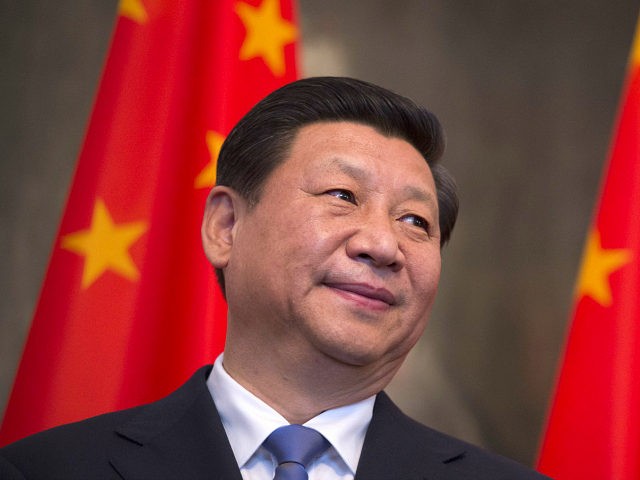Chinese communist leader Xi Jinping met United Nations Secretary-General Antonio Guterres in Beijing this weekend and reportedly urged the leader to further promote “global governance” to solve the world’s problems.
Xi has explicitly expressed a desire to see China become the “keeper of the international order,” defining and enforcing international law.
Guterres was in Beijing to meet with Xi and reportedly thanked the Chinese communist government for supporting the U.N.
China’s state-run Global Times newspaper reports that Xi “expressed the need to improve global governance” during the meeting. “Whether it is domestic governance or global governance, we must have people’s sense of fulfillment as the objective and continue to provide confidence and expectations of stability for the people,” Xi reportedly said. “We need to keep pushing for and improving global governance to deal with this challenge.”
Xi reportedly insisted that China’s international policies, particularly the One Belt, One Road (OBOR) project—a major international infrastructure plan designed to cement Chinese influence in foreign governments—were necessary for “people’s happiness and national rejuvenation, and to seek common ground for the world.”
The head of the nation’s military and only influential political party, who also maintains the largely ceremonial title of “president,” nonetheless claims that Beijing “will never impose our own path, models, and theories on others,” said the president.”
According to the United Nations’ summary of the meeting, Guterres “expressed his appreciation for President Xi’s support to the U.N.’s work and told him that the U.N. continues to count on China’s leadership and commitment.” Guterres also applauded China for its role in the North Korea nuclear crisis. China is North Korea’s largest trading partner, single-handedly holding up the rogue nation’s economy and making it possible for dictator Kim Jong-un to continuously threaten a nuclear strike on the United States, South Korea, and/or Japan.
Kim Jong-un made his first visit to a foreign country as dictator of North Korea to Beijing in late March, where Xi gifted the dynastic ruler with an estimated $400,000 in luxury items likely banned by U.N. sanctions. Information regarding the gifts is largely unavailable, as Chinese media only broadcast images of Kim accepting the gifts, used by media observers to estimate the price.
Xi Jinping has long been proposing the establishment of a global government with China at the helm, though nominally rejecting the idea of Chinese hegemony. During the Davos Economic Forum last year, Xi asserted that the world needed more “global economic governance” in a speech in which he warned against “populism” and nationalist sentiment. In October, during a three-hour speech to the Communist Party, Xi asserted that China would no longer compete with other nations for supremacy. “It is time for us to take center stage in the world and to make a greater contribution to humankind,” he stated then, not mentioning the United States in his speech.
In January, Xi once again asserted in his New Year’s Eve speech that he hoped to guide China to become “a builder of world peace, contributor of global development and keeper of international order.”
China has been pushing for years to wrest away power from the United States in upholding free speech regulations for the Internet, instead offering to lead the enforcement of a set of rules and regulations on what can be said and published online. In 2016, President Barack Obama relinquished American control of the internet to an international coalition including China, placing Xi one step closer to this control.
China’s bid for global governance is severely compromised by an issue that Guterres reportedly did not mention during his meeting with Xi: China’s invasion and colonization of the South China Sea. China claims “indisputable sovereignty” over waters belonging to Vietnam, the Philippines, Malaysia, Brunei, and Taiwan, as well as international waters it seeks to govern. The People’s Liberation Army (PLA) has spent years building artificial islands on reefs and atolls in the Philippine and Vietnamese parts of the sea, equipping them with significant military hardware including fighter jets, surface-to-air missiles, and advance surveillance equipment.
In July 2016, the Permanent Court of Arbitration at the Hague ruled against China in a case brought by the Philippines. China announced it would ignore international law and keep building in the region, anyway. Ignoring the ruling, Chinese Ambassador to Moscow Li Hui said, was necessary to “protect the dignity of international law.”
A report published this weekend revealed that China recently armed one of its artificial South China Sea islands with military jamming equipment to damage the ability of ships passing through the region to communicate with their home bases and each other.

COMMENTS
Please let us know if you're having issues with commenting.